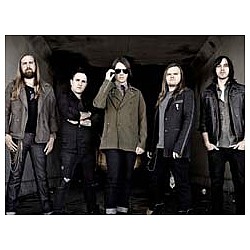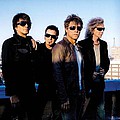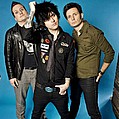The Red Jumpsuit Apparatus rage on with "Reap".
The group's first single from their forthcoming Am I the Enemy roars with a hyper-charged, hypnotic chorus and an industrial-fueled grind. Vocalist Ronnie Winter pens some of the sharpest lyrics of the band's career thus far, and The Red Jumpsuit Apparatus strike the perfect balance between post-hardcore grit and electronic sheen. "Reap" is only a taste of the brilliance to come on Am I the Enemy though. It's bound to be one of the most important and infectious rock releases of 2011…
The Red Jumpsuit Apparatus vocalist Ronnie Winter spoke to ARTISTdirect.com editor and Dolor author Rick Florino in this exclusive interview about "Reap", Am I the Enemy, and so much more in this exclusive interview.
What's the story behind "Reap"? What does it mean to you?
It's a pretty cool story. I've never covered a song in our career as Red Jumpsuit Apparatus. I've always written the lyrics and melodies. However, I was approached with idea of writing with someone. I didn't want to write with just any Joe Shmoe who didn't know our music or care about what we do. At least, that was my idea of how it worked. Granted, I'd never done it before so I didn't really know what I was talking about [Laughs]. I was given a list of people who were available at the time, and I saw John Feldman's name on it. He's one of my all-time favorite lead singers. GoldFinger was a huge band for me and everybody in the southeast back in '98 and '99. When I was in high school, GoldFinger, blink-182, NOFX, and MXPX were my heroes. Seeing John's name on the list, I was like, "Hell yeah, I want to write with him. He's my number one choice!" We contacted him, and he was down. We met up and on the first every day we sat in his kitchen in the Hollywood Hills. I was on a natural high being able to meet the guy and hang with him on a chill level. Most people have to meet their favorite artists by waiting in line at a signing [Laughs]. We sat around and talked about everything that we had gone through in the past couple of years, where my head was musically, things I was into at the time, and "Reap" was the very first song that we wrote together right there in his kitchen. We both expressed how cool we thought it was so we turned around and wrote another song the very next day. He was like, "Why don't you come back tomorrow and we'll try another one?" We wrote "Salvation", and the same thing happened. We vibed and gelled right away. Then, we recorded two demos. Sitting in the mixing room, we knew we had something really good going. I just thought, "What the hell? I'm going to ask him." I said, "Dude, let's just make a record together! Look at what we did in two days!" He thought about it for two or three minutes and replied, "Let's do it." It went from songwriting to making a record together.
Where were you coming from lyrically for "Reap"?
It's a mixture of two different perceptions. Looking at the world, there is so much crazy stuff going on. Everybody is aware of the issues in the Middle East and all of the upheaval overt here. People are starting to figure out that they're being treated horribly by their government and democracy and freedom is a much better way to allow people to live. It doesn't take a politician to tell you that living under oppression is crappy for anybody. With all of that energy floating around over there, these world leaders are reaping what they sow. They've been controlling these people, information, media, and strangling their own people. Now, they're uprising against them. Part of the song is about that. Part of it is also expressing the fact that when we left our label we know we made the right decision because we felt like we were being oppressed and shaped into something that we didn't like and didn't want to be. Instead of trading our soul, we said, "No, we're going to stay true to ourselves." A lot of people told us it was the wrong decision. We left them; they didn't leave us.
Is it important for you to tell stories with your songs?
I'm a fan of Pink Floyd. Growing up when I would listen to their songs, I would immediately picture what I thought their music video would look like or what the David Gilmour and Roger Waters were talking about. My parents were really into old school rock so I was lucky enough to be exposed to really great music at a young age. All of the songwriters and bands that I've liked have always been able to paint that graphic picture. I was molded into that by the music that I listened to.
"Reap" certainly does that.
It's definitely a conscious effort. You'll sometimes hear songs where the lyrics don't make any sense. People will rhyme the same word with the same word. That's more in the pop world. I can't jam out to a song that doesn't mean anything to me. You've got to have meaning. A song has to paint a picture in my brain that I can understand. The hardest part is the balance between painting a vivid picture and making it easy for everybody to understand.
Is "Reap" a proper gateway to the rest of Am I the Enemy? Where else do you go on it?
[Laughs] That's always the hardest question when we release a record. I'm glad you asked me because nobody has yet. We have a very weird mentality when we make records. We believe that most kids nowadays don't listen to records all the way through. We call it, "The iPod generation." When we make records, we call them, "Red Iumpsuit Playlists." Every song doesn't sound like "Reap," I'll tell you that right now. Every song is different. We have some songs that sound a lot like our ballads on the first record. We've got some songs that are a little more alternative like the second record. The majority of the songs—at least four or five tracks—are a bit more aggressive like "Reap." This is the new "Red Jumpsuit Playlist"; it's called Am I the Enemy. That's the best way I can explain it.
There's an industrial undercurrent to "Reap." Is industrial music an influence?
Oh yeah, dude! Mainly it's Nine Inch Nails. I'm a huge NIN fan. Everybody in the band is. I don't see how you could be into music and not love Nine Inch Nails. A lot of that is John Feldman. He has a really cool way of bringing electronics into a song to where it doesn't sound like you're trying to completely change. I give him all the credit for that. He engineered all of the cool, industrial aspects. There's a lot of that on the record. I would say that's the main difference between this and the last two records. There are a lot of experimental electronics on almost every song. I don't think it takes away. I think it adds to it. We're enjoying the new twist, and I'm glad you noticed it. There are definitely some industrial undertones.
How was the Seether tour?
It was pretty badass to be an opener for once. I don't think we've actually opened a tour since 2006. We played for 30 minutes, and then we got to hang around and watch Seether for free [Laughs]. It was really fun and stress-relieving. After headlining for years and years, it's cool to just hang out and enjoy the show. The Seether guys are great! They were so cool to us, and they crushed it selling out every night. I've learned a lot from them. With their style and the way they present themselves, they're definitely an A-plus band. This tour was kickass.
—Rick Florino
05.26.11
Have you heard "Reap" yet?
The Red Jumpsuit Apparatus news










